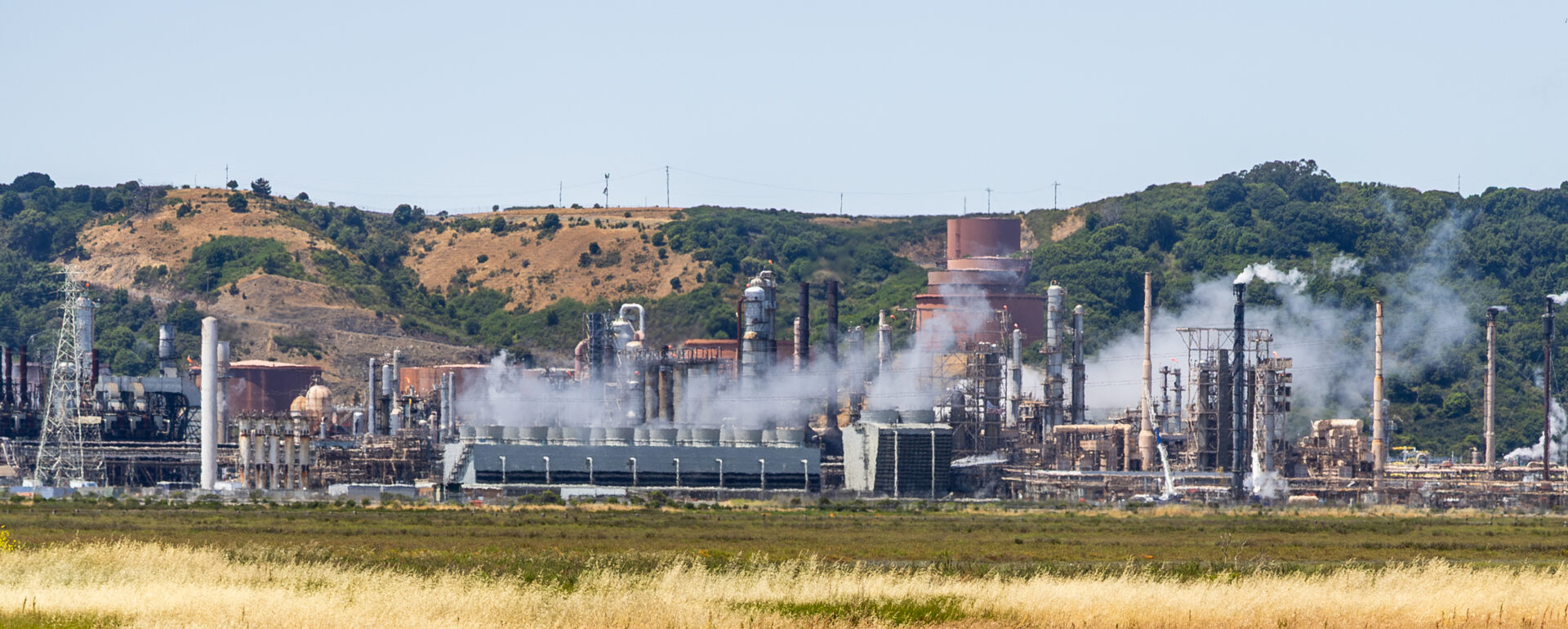Refineries
Oil refining in Richmond, Wilmington and Southeast LA poses an existential threat to these communities. Tank farms vent to the air we breathe, refineries flare and poison the land, air and water and biofuels refining is proving even more dangerous to residents and workers than fossil refining.
CBE is using legal tools to support a just transition away from refining transportation fuels.
Some refineries, including refineries in Wilmington and Torrance, still use hydrogen fluoride (HF).
HF is extremely dangerous. Exposing as little as 1 percent of a person’s skin to HF can be fatal. When inhaled, HF can fatally damage lungs, disrupt heart rhythms, and cause other serious health effects. Refineries in our communities store tens of thousands of pounds of HF.
In 2024, CBE joined with other communities who are threatened by HF to petition U.S. EPA to regulate HF at refineries. EPA declined. Along with allies NRDC and Clean Air Council of Pennsylvania, CBE sued, seeking a nationwide rulemaking to protect ourselves and all the country’s HF refinery communities.
In 2020, World Oil sought permits to massively increase its tank storage in Long Beach, impacting communities throughout LA’s South Bay. Community members persistently objected to a proposed approval that would have determined the project could not impact the environment.
After three years of community work, the City and Port released and approved an environmental impact report that failed to accurately describe the project and its impacts, and did not adequately mitigate or consider alternatives.
In partnership with Earthjustice, CBE sued. We continue to seek accountability and CEQA compliance for this project.
Biofuels Conversions
After decades of funding climate change denial, some oil companies are now betting that the way to avoid shuttering refineries (and being stuck with cleanup responsibility) is to shift from turning fossil oil into fuel to turning other oils – like oils from food – into fuel.
The first California refinery to seek a complete biofuels conversion is in Paramount, LA, where a mostly-defunct refiner was acquired for that specific purpose. Shortly thereafter, the Marathon and Phillips refineries in Contra Costa County submitted applications to convert their processes. CBE weighed in on the CEQA review for each of these three projects. Unfortunately, despite our detailed concerns, each project was approved.
On May 16, 2022, CBE, along with East Yard and Center for Biological Diversity, filed a CEQA suit in LA superior court challenging the adequacy of Subsequent EIR for the small, century-old Paramount refinery to expand its biofuels production to 25,000 barrels per day; build a fossil gas (gray) hydrogen generation unit to produce over 75 million scf of hydrogen per day; and install a fossil gas pipeline through residential neighborhoods.
We are represented by, and co-counsel with, Earthjustice.
On June 7, 2022, CBE and Center for Biological Diversity sued Contra Costa County and Phillips 66 over inadequate CEQA review. Once completed, the Rodeo Project would produce over 1 billion gallons per year, measured as 24.4 million barrels per year (at 67,000 barrels per day, or bpd), of bio-based diesel fuel and other transportation fuels. The Project could also receive, blend, and ship up to 40,000 bpd of gasoline and gasoline blendstocks. Our legal team was composed of Shute, Mihaly and Weinberger, the Stanford Environmental Law Clinic and Center for Biological Diversity.
The next day, our same coalition sued the County and Marathon over inadequate CEQA review at another biorefinery conversion project. Less than 10 miles from the Rodeo Project, the Marathon Refinery in Martinez aimed to convert its shuttered crude refinery into a facility that could process over 17 million barrels per year of biofuels (at 48,000 bpd.)
In both cases, the court found that the County had improperly conducted its CEQA analysis, and the result in both was that additional odor mitigation measures would be planned and implemented to minimize the impacts on surrounding communities.
The incentives provided by California’s Low Carbon Fuel Standard (LCFS) are a significant driver for the refinery biofuels conversions. First adopted in 2009, the LCFS program generates billions of dollars for transportation fuels. Although zero-emissions electric vehicles (“EVs”) have become widely available since the program’s inception, the lion’s share of LCFS revenues go to polluting fuels like biofuels instead of EV technologies.
Biofuels derived from food crops are of particular concern because they cause a host of adverse impacts to vulnerable communities when they are grown, when they are refined, and when they are combusted in vehicles. Biofuel feedstock cultivation is linked to increased global food insecurity and deforestation, biofuel refining increases exposure to toxic and criteria air pollution in surrounding communities, and biofuel combustion in vehicles emits pollution that harms Californians already breathing unhealthy air.
In 2025, CARB adopted major amendments to LCFS. Rather than leaning into the vital transportation sector carbon reductions that are both technologically feasible and vital at this time, CARB brushed aside evidence submitted by impacted community members, academics, scientists, advocates, and former CARB staff on the significant harms from crop-based biofuels and the need for LCFS to include effective limits on their participation in the program.
Working with Earthjustice, and in collaboration with EJ voices in the Central Valley, CBE sued.

